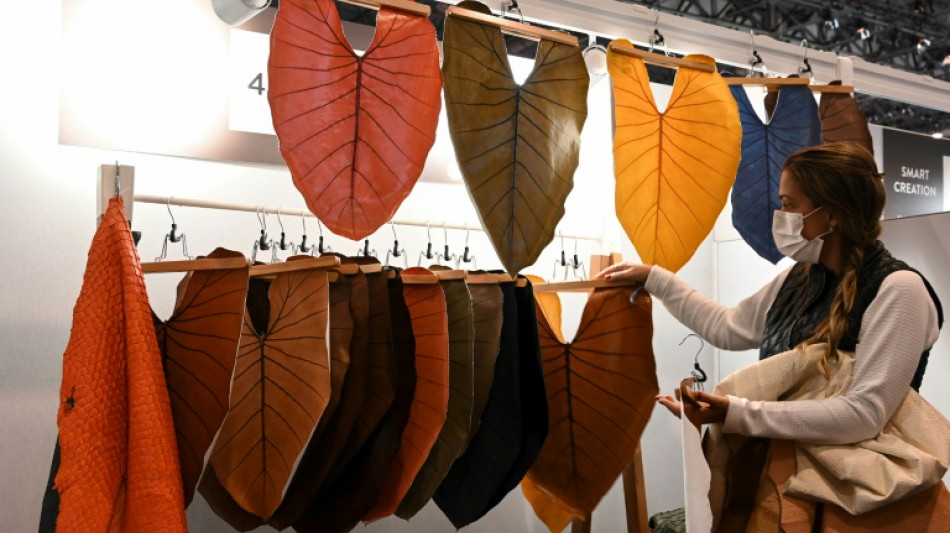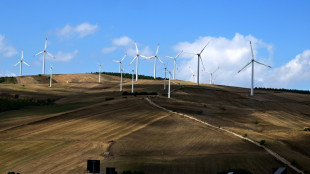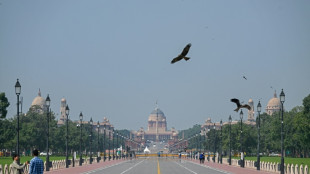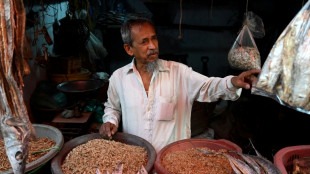
-
 Snowstorm blankets US northeast as New York sees travel ban
Snowstorm blankets US northeast as New York sees travel ban
-
Healthcare crisis looms over Greenland's isolated villages

-
 Hodgkinson says breaking 800m record would put her among athletics' greatest
Hodgkinson says breaking 800m record would put her among athletics' greatest
-
Two Russian security personnel were on board France-seized tanker: sources

-
 EU puts US trade deal on ice after Supreme Court ruling
EU puts US trade deal on ice after Supreme Court ruling
-
Hetmyer blasts 85 as West Indies pile up 254-6 against Zimbabwe

-
 Canada PM heads to Asia seeking new trade partners as US ties fray
Canada PM heads to Asia seeking new trade partners as US ties fray
-
South Africa accepts Trump's new US ambassador

-
 Iraq's Maliki defends PM candidacy, seeks to reassure US
Iraq's Maliki defends PM candidacy, seeks to reassure US
-
UEFA suspend Benfica's Prestianni after alleged racist abuse

-
 Jetten sworn in as youngest-ever Dutch PM
Jetten sworn in as youngest-ever Dutch PM
-
Italy's Enel to invest 20bn euros in renewables by 2028

-
 BBC apologises for 'involuntary' Tourette's racial slur during BAFTA awards
BBC apologises for 'involuntary' Tourette's racial slur during BAFTA awards
-
Kristen Bell returns to host glitzy Actor Awards in Hollywood

-
 Iran says would respond 'ferociously' to any US attack
Iran says would respond 'ferociously' to any US attack
-
Venezuelan foreign minister demands 'immediate release' of Maduro

-
 Dane Vingegaard to start season at Paris-Nice in March
Dane Vingegaard to start season at Paris-Nice in March
-
Australia PM backs removing UK's Andrew from line of succession

-
 Where do Ukraine and Russia stand after four years of war?
Where do Ukraine and Russia stand after four years of war?
-
Police investigating racist abuse of Premier League quartet

-
 Fiji to start Nations Championship at 'home' to Wales in Cardiff
Fiji to start Nations Championship at 'home' to Wales in Cardiff
-
EU lawmakers to put US trade deal on hold after Supreme Court ruling

-
 Rubio to attend Caribbean summit as US presses Venezuela, Cuba
Rubio to attend Caribbean summit as US presses Venezuela, Cuba
-
'Ugly' England aim to spin their way to T20 World Cup semi-finals

-
 Nigeria paid Boko Haram ransom for kidnapped pupils: intel sources
Nigeria paid Boko Haram ransom for kidnapped pupils: intel sources
-
Tudor says Tottenham can still beat the drop despite Arsenal loss

-
 Violence sweeps Mexico after most-wanted drug cartel leader killed
Violence sweeps Mexico after most-wanted drug cartel leader killed
-
France giant Meafou capable of being 'world's best' lock

-
 Stocks diverge, dollar down over Trump tariffs uncertainty
Stocks diverge, dollar down over Trump tariffs uncertainty
-
World champions South Africa announce eight home Tests for 2026/27

-
 Liverpool boss Slot encouraged by Mac Allister's return to form
Liverpool boss Slot encouraged by Mac Allister's return to form
-
India replaces British architect statue with independence hero

-
 Pakistan warn England's flaky batting to expect a trial by spin
Pakistan warn England's flaky batting to expect a trial by spin
-
Philippines' Duterte authorised murders, ICC told as hearings open

-
 Iran says would respond 'ferociously' to any US attack, even limited strikes
Iran says would respond 'ferociously' to any US attack, even limited strikes
-
New Dutch government sworn in under centrist Jetten

-
 What the future holds for the CJNG cartel after leader killed
What the future holds for the CJNG cartel after leader killed
-
ICC kicks off pre-trial hearing over Philippines' Duterte

-
 UN chief decries global rise of 'rule of force'
UN chief decries global rise of 'rule of force'
-
Nemesio Oseguera, the brutal Mexican drug lord known as 'El Mencho'

-
 Senegal's Sahad, radiant champion of 'musical pan-Africanism'
Senegal's Sahad, radiant champion of 'musical pan-Africanism'
-
New York orders citywide travel ban as major storm hits US

-
 'Considered a traitor': Life of an anti-war Ukrainian in Russia
'Considered a traitor': Life of an anti-war Ukrainian in Russia
-
South Korea and Brazil sign deals on K-beauty, trade

-
 Zimbabwe farmers seek US help over long-promised payouts
Zimbabwe farmers seek US help over long-promised payouts
-
Hong Kong appeals court upholds jailing of 12 democracy campaigners

-
 India battle for World Cup survival after 'messing up on grand scale'
India battle for World Cup survival after 'messing up on grand scale'
-
'I will go': Bengalis in Pakistan hope for family reunions

-
 North Korea touts nuclear advances as Kim re-chosen to lead ruling party
North Korea touts nuclear advances as Kim re-chosen to lead ruling party
-
South Korea protests 'Victory' banner hung from Russian embassy


Bananas to fish scales: fashion's hunt for eco-materials
Sneakers made from banana or pineapple leaves, dresses from nettles or fish scales -- the search for sustainable materials has taken the fashion industry to some wild places.
Experts warn these new textiles are not a quick fix for fashion's enormous problems with over-consumption and waste, but may be a necessary step in developing cleaner technologies.
"You could possibly eat the final product," said Hannes Schoenegger, co-founder of Bananatex, which uses leaves from banana trees in the Philippines to make bags, T-shirts and a line of shoes for H&M that sold out within two hours.
He was speaking at the Premiere Vision Paris conference, where industry professionals gather to find out which fabrics will dominate coming seasons.
"We only harvest the sides of the plants, and they're already growing in the forest, so no chemicals, pesticides or even water are used," Schoenegger added.
He was among multiple stalls presenting new bio-sourced materials.
Brazil-based Nova Kaeru offered leather made from the discarded scales of the giant pirarucu fish and another from the tropical "elephant ear" plant.
Nearby, Ananas Anam showed off some Nike shoes made from waste pineapple leaves.
- Nettles are in -
These textiles can be relatively niche, but some companies are determined to bring them into the mainstream.
Spanish firm Pyratex offers multiple options, from recycling the waste of corn and sugar cane production, to making fibres from Icelandic seaweed, Chinese bamboo or Austrian wood.
"It's not about replacing cotton with one alternative crop. It's about finding a wide variety of substitutes to make sure that nothing is over-used," said spokesperson Pilar Tejada Lopez.
One plant getting particular interest is the nettle, which can be turned into a silk-like and incredibly strong fabric that can be used in everyday and luxury clothing.
It highlights the fact that many of these technologies are not new.
"Nettles have actually been used for clothing for centuries, but we have largely forgotten," said Lopez.
"Part of our job is reintroducing these ideas that have been lost."
- Natural limits -
Others warn of over-reliance on new materials in the drive towards sustainability.
"Replacement materials serve no purpose if we continue to make the same amount of clothing," said Victoire Satto, of The Good Goods, a media firm specialising in responsible fashion.
They could even add to the problem if scaled up by encouraging further deforestation to make way for newly fashionable plants, she said.
That is why companies like Bananatex refuse to go beyond natural farming limits.
"Our project is part of a reforestation programme, a good way of revitalising soils and providing work to local families," said Schoenegger.
"There's a natural limit and we won't go beyond that, because then it would be harmful."
Pyratex similarly puts a lot of emphasis on partnering with responsible farmers, and avoiding the ultra-complex supply chains that make it difficult for clothing companies to know who grows their raw materials and in what conditions.
But Satto says more research is also needed on the durability of bio-sourced materials, since half the ecological damage from an item of clothing is linked to its disposal.
"If the product only lasts six months, that's enormous in terms of environmental impact," she said.
- Iterations -
Ifeanyi Okwuadi, an award-winning British designer, says his focus is on how clothes are made -- not what they are made from.
"When I speak about sustainability, I'm talking about the construction -- right down to using the right stitch-length for each stitch because that kind of minute detail affects the longevity of the garment when you put it in the wash," he said.
He says many bio-sourced materials are still evolving.
"Right now, there's a lot of buzzwords to draw you in, but eventually we won't need to say it's from bananas or whatever -- it will just be plant-based fibres."
"I don't use them in my work because the tech at the moment is quite primitive. But I see them as iterations, like with all technology, and we need these innovations."
U.AlSharif--SF-PST



